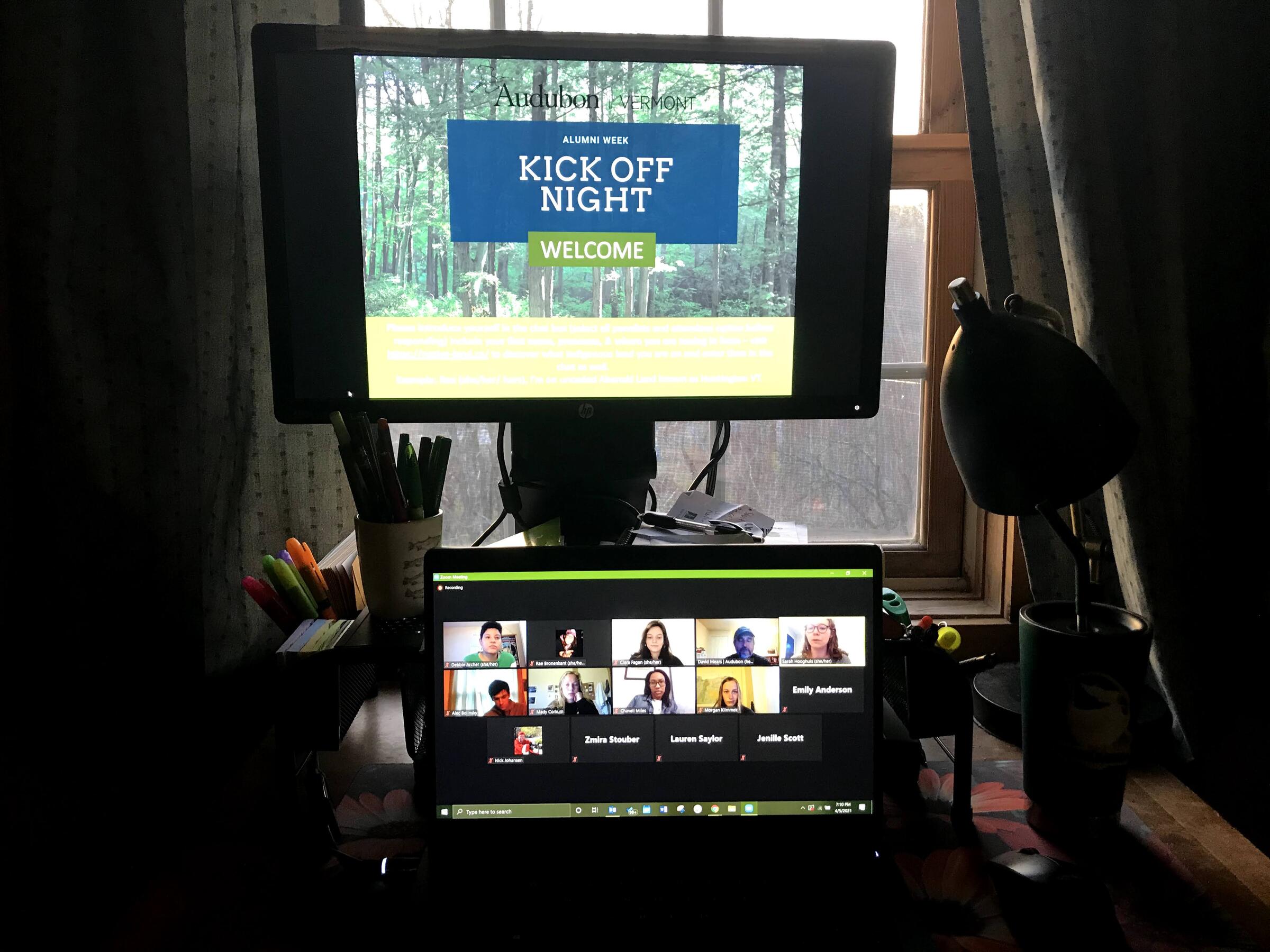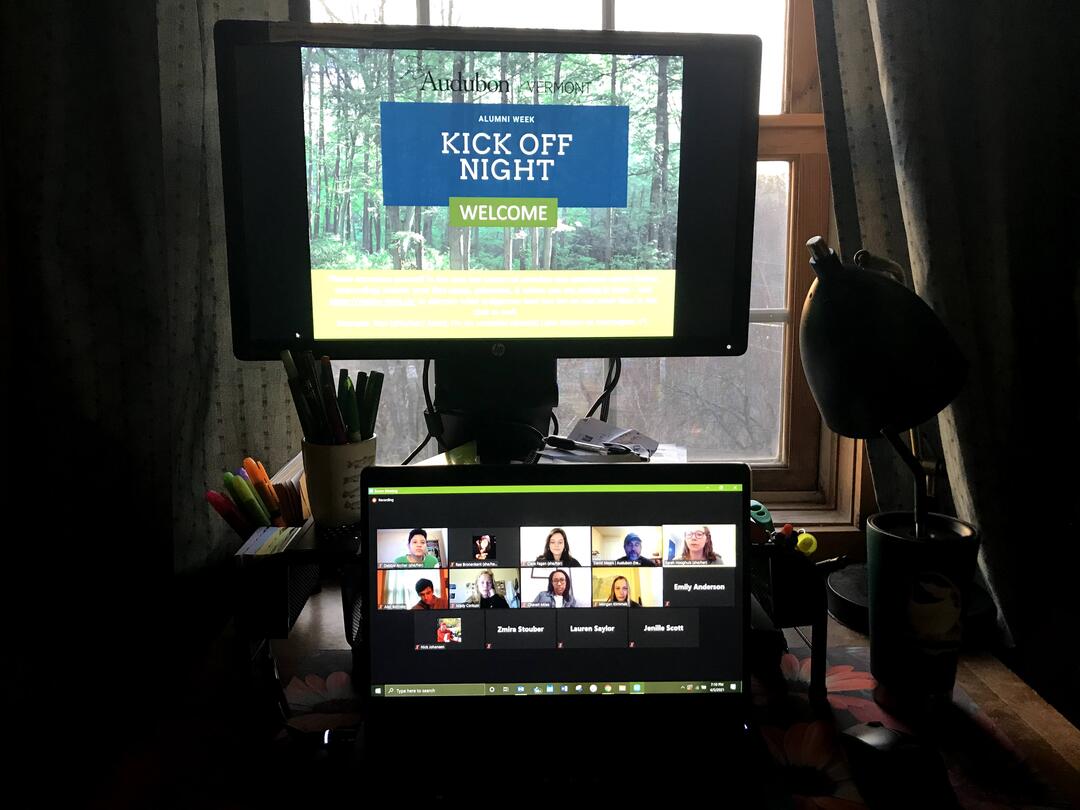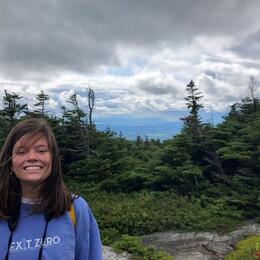We started the month of April off with the first-ever Alumni Week! This event was put together with the Youth Conservation Leadership Program in mind. Generously supported through the Maggie Walker Incentive Fund Grant, Audubon Vermont provides opportunities for the next generation of conservation leaders through our structured, paid internship program, student-led campus Audubon chapters, and the Vermont Youth Conservation Corps environmental literacy training module.
Alumni Week aimed to create a space for current and former participants of the Youth Conservation Leadership Programs to build a community that would foster learning and professional development between one another. We also invited the public into these events as a way of learning about our Youth Leadership Program and connecting with the Audubon community.
Kick-off Night
Monday night highlighted the experiences of myself, a current Education and Engagement Intern, and Sarah Hooghuis, our Education and Outreach Americorps Member. In a conversation with Audubon Vermont Executive Director David Mears, Sarah and I talked about our times at Audubon. We discussed a bit about our relationships with the outdoors and what brought us to our positions at Audubon in the first place, and we shared anecdotes of some of our favorite memories from our time here so far. We also discussed how the past year in particular has affected not only our personal lives but our work at Audubon as well. Both of us have seen our relationships with birding and the outdoors change since living through the pandemic. For Sarah, this was through a greater appreciation for phenology and using her time throughout the pandemic to really notice the small changes that take us from season to season. I spoke about the effect the pandemic has had on my mental health. Though I have struggled with depression, anxiety, and PTSD for long before COVID hit, this past year has felt like a tornado of exacerbated symptoms and struggles. I wasn’t getting out and birding as much for the past year. I felt like I fell behind and out of a “level” of birding that I would have otherwise grouped myself in. Though it’s unlearning I am continuing to do, I am starting to find the joy in slower birding and appreciating birds even if it’s just on my walk to take out the trash each day. David also asked Sarah and me what it’s been like working for a branch of the National Audubon Society as they strive to become an antiracist organization—we both discussed the work we are doing to be actively antiracist in the workplace and how National has fallen short of our expectations and community needs.
After Sarah and I were given the opportunity to speak about our own work, we got to reconnect with the alum of Audubon Youth Leadership programs. We were joined by education and policy interns from Audubon Vermont’s past and present and got to catch up with one another about where we’re all living, what work we’re doing, and (of course) what birds we’ve been seeing. This was a really meaningful space for me. As isolation has been hard on just about everybody in the world over the past year, I’ve been struggling to feel connected to those around me. This event was a great opportunity for me and other young professionals to connect and be vulnerable about the hard things going on right now. We touched on student debt, mental health struggles, and fruitless job searches. While not fun conversation topics, and topics that are on my mind far too often, I left Monday night feeling more hopeful than I had in a while. I am so thankful for all the other Audubon alumni who opened up and helped bolster my sense of community.
Networking Panel
Tuesday night alumni and other young professionals were invited to tune in and hear from our panel of professionals in the conservation field. Panelists included:
- Jim Shallow, Director of Strategic Conservation Initiatives, The Nature Conservancy Vermont
- Nathaniel Sharp, Data Technician, Vermont Center for Ecostudies
- Kerri McAllister, Program Manager, and Place-Based Educator, Shelburne Farms
- Amy Seidl, Audubon Vermont Board Member and Senior Lecturer at the University of Vermont
- Marcelo Dias, International Lawyer, and Ph. D. candidate, Queensland University of Technology, Former Global Consultant for the Governor’s Climate Forest Task Force
- Bonnie Acker, Environmental Activist and Artist
- Margaret Fowle, Conservation Biologist, Audubon Vermont
- Bridget Butler, Founder, and Owner, Bird Diva Consulting
Emily Kaplita, one of Audubon Vermont’s Teacher/Naturalists, moderated the event and started off by first sharing a bit about her own journey getting to Audubon Vermont (Emily was our first AmeriCorps member!). Each of the panelists then took turns sharing a bit about their own career paths and what led them into the current work they do. In breakout groups, panelists were able to answer questions from our alum and share their own wisdom, experiences with frustration in the job field, stressors, and existential crises, and moments of joy that they’ve found along the way. In the breakout group, I sat in with panelists Nathaniel Sharp and Jim Shallow as we discussed accessibility hurdles in the way of moving forward in the conservation field. Working in this field can often include jobs in isolated locations void of affordable housing and public transportation. Jobs often expect that you would apply being equipped with gear and supplies necessary to be in the field for long hours. Nathaniel and Jim both spoke to work being done at their respective workplaces to break down these barriers but also acknowledged that the barriers are there. We all expressed our frustration around this and hopes for the field moving forward.
We reconvened as a group after breakout sessions to hear more about time management skills (Bridget endorsed post-its, which I am also personally a huge fan of), and sentiments of hope as we navigate moving forward in the professional world. When it came down to it, the panelists all had different stories with similar messages. They followed their passions and picked up new passions along the way. They worked odd jobs and moved places often with a motivation to ski and not much else. Not many of them would have been able to picture where they are now if you had asked them when they first started out in their careers. They all endorsed community and connection, and what was so heartwarming for me to see was that this panel was a reunion of sorts for some of them as well.
Trivia Night
Wednesday night of Alumni Week was our Trivia Night, co-hosted by the University of Vermont’s Audubon Campus Chapter. We were lucky enough to hear from Gustavo Figueroa, the Student Outreach Associate at the National Audubon Society. Gustavo touched on his own journey to getting his position with National Audubon and set a tone of encouragement and hope for the night’s participants. The night was then run by Audubon Vermont’s Youth Leadership Coordinator, Rae Bronenkant, along with two representatives from the UVM Campus Chapter—Jasper Barnes and Grace Yaros. The UVM Campus Chapter is in its third year with over 100 members! Together they have worked on implementing bird-safe glass on campus and creating a hotspot highlights map of local birding spots. The rest of the night was filled with a fun game of trivia and chats all about birds.
Changing the Story Around Birding
Thursday night we hosted a panel on Changing the Story Around Birding. The goal of this event was to open up a conversation about accessibility issues in birding, to discuss the exclusive and oppressive history of birding, and to envision a future of equitable birding. Our panelists included:
- Sam DeJarnett, Host, “Always Be Birdin’” Podcast
- Freya McGregor, Occupational Therapist, and Birdability Coordinator, Birdability
- Jordan Rutter, Co-Founder, Bird Names for Birds
- Gabriel Foley, Co-Founder, Bird Names for Birds
This night was moderated by Audubon Vermont’s Education Manager, Debbie Archer. The panelists began by introducing themselves and the work that they do. The panelists also shared what got them into birds and birding in the first place. Debbie shared that for a long time, she has had a hard time calling herself a “birder.” She also noted that the same thing happens with coworkers at Audubon—they are hesitant to call themselves birders. After realizing that she had a very specific image of what, or who, a “birder” was she decided it wasn’t her, but she now feels that she is reclaiming that title. She then asked the panelists if they’ve gone through similar experiences trying to own the title of “birder” and asked them to share what it meant to them to be a birder. This question opened up so many conversations about what image comes to mind when we think of a “birder.” We heard from the panelists about white supremacy and ableism in the world of birding, and the toxicity of “good” birds vs. “bad” birds, and the xenophobia it perpetuates. I learned so much from all of our panelists on Thursday night and urge you to read about and support the work that they are doing. It is also so important that as birders we continue to educate ourselves on accessibility issues in order to build a more equitable community.
Audubon Vermont looks forward to continuing to hold these events in the future. I closed my laptop on Thursday night and felt emotional and filled with so much gratitude for this week and for all the folks I got to connect with as a result. I’d like to especially thank Debbie and Rae who I worked together to make this amazing event come together, along with our panelists, speakers, and all of our participants throughout the week.






